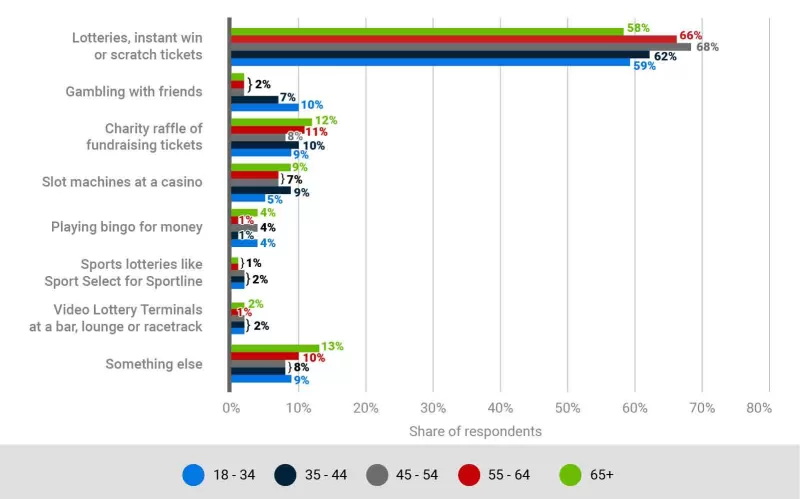Gambling as an industry is nothing new to Canada. This is a legally permitted and regulated endeavor and is a popular entertainment for locals and tourists. Being a gambling-tolerant country, I've been gambling profitable for many years and I've been curious about the country's gambling statistics. How are gambling demands in Canada represented in the numbers, and what are the trends in the data? Of course, looking at percentages and pie charts isn't fun (honestly, few), but here I'd like to go beyond the numbers and draw the most interesting conclusions about casino statistics.
Canada Gambling Statistics
Why are statistics important? Well, if the experts get together and look up something, everyone will be able to understand better. We love gambling, so we looked at the casino industry statistics to reveal the curiosity behind the numbers. In this case, we do not deal with online casino statistics, only offline data collected from relevant investigations and authoritative reports.
Game preferences
The most popular gambling in Great White North is by far the bet on the lottery. The participation rate was 65%. Next is instant gambling (36%), with 22% of Canadian gamblers using the casino. According to a 2013 survey by Ipsos Reid Lottery & Gaming, 49% of participants say they play slots whenever they visit the casino.
Combined with the respondents' willingness to spend, we can see that most of the money is spent on slots. This is followed by card games such as lottery, blackjack and poker. Of course, these reports do not include sports betting, which is very popular among Kanax. However, the lottery is the god that many Canadians pray for. Most people don't think of gambling because lottery tickets are so popular and rooted in public awareness.
Age distribution

The legal gambling age for Lumberjack Country is 18 or 19 depending on the state. The younger generation of gamblers is a minority. Statistics show that young Canadians between the ages of 18 and 24 are more interested in Xbox and PS games than casinos. In a 2016 survey, 59% of respondents between the ages of 18 and 34 admitted that they had participated in lottery tickets, instant wins, and scratch-offs the previous year. The most common age group in a single year was 20 to 29 years old.
In Canada's gambling world, there are many bettors between the ages of 35 and 50 overall. Bingo players are more than 40 years old, and slot players are 55 to 64 years old. What's interesting is that all other age groups fall short of the number of advanced slots. Are we surprised? it's not.
State statistics
Statistics for the casino gaming industry are categorized by the province of Canada. This is exactly what we are doing, and we can see an interesting landscape of cultural tastes at the state level. It also revealed how accessibility to certain types of gambling affects local participation.
So far, let's take a look at the numbers. VLT is allowed in Manitoba, but not in Ontario. Participation rates in these two states are 21% and 2%, respectively. If you take a look at Bingo, you'll see that it's generally played a lot in Atlantic Canada.
Quebec has more than 10,000 gambling facilities (casinos, lottery, etc.). It's probably the most gambling state. Quebec has a gambling participation rate of 66% and Ontario has a participation rate of 83%. Of the $ 17.3 billion generated by the Canadian gambling industry in 2017, Ontario generated 43%. After all, it's Canada's most populous state.
Gambling addiction
Did you know that people with problems often claim that they have no problems? Many people deny problematic gambling or feel that they can't stop even if they want to. Only 2% of Canadian gambling addicts admit that they may think they have a problem gambling addiction. On the other hand, 15% of people never thought that their gambling privileges were excessive. Typical signs of gambling addiction are:
- The person wants to gamble rather than do what he used to enjoy.
- People who are often late for work or school because of gambling
- Invoices accumulate because you forget to pay or spend money on gambling.
- He no longer wants to associate with friends and family. Someone who likes to see cards hit the blanket and roulette balls fall.
- Emotions come out of nowhere
- Bored if you're not gambling
The Ontario Problem Gambling Institute reports that about 3.2% of Canadians are dependent on gambling. pain!
How Much Money Do Canadian Gamers Spend on Gambling?
Now it's time to have fun. How much money do Canadians actually spend on their favorite casino games? According to national figures, 60% of the population is involved in gambling. Of this, 43% spend between $ 1 and $ 20 a month. About 14% of people spend between $ 20.01 and $ 100 a month. Less than 3% of stocks cost more than $ 100 a month.
It's not bad. What is interesting is the potential consumption of Canadian millennials. This is a 2014 survey that shows that the millennial generation spends an average of $ 123 on card games (= poker). This is what they reported the last time they visited the casino.
Male vs. Female: Who will gamble more?
Even if you don't know the casino statistics, it seems that men are more likely to gamble than women. As far as online gambling is concerned, more than 80% of gamblers are men and only 17.6% are women. Non-Internet statistics have different pictures, making them more balanced. Forty-three percent of women said they wouldn't bet, while 37% of men said they wouldn't spend money on gambling. Most importantly, more men gamble than women, but the difference isn't as big as you might think.
Canada's sustainable gambling industry
It is said that at least 76% of Canadian adults are somehow gambling. As of 2017, this percentage is close to 30 million Canadians. Gambling acceptance is culturally widespread, and the government attaches great importance to the income generated by the gambling sector. In short, Canada is a gambling paradise. It's a gambling paradise where players aren't swayed by digital data. Taking a step back and mastering the numbers may correct some habits. Gambling statistics are interesting and useful if you look at gambling the right way.
FAQ
📌What are the current trends in gambling in Canada?
The biggest trend and admiration is that gambling income is being used to drive domestic employment and economic growth.
📌What is the percentage of problem gambling in Canada?
Statistics on gambling addiction in Canada range from 0.04% in Quebec to 1.4% in Manitoba. The rate in Saskatchewan is 1.2%.
📌Is Gambling Addiction Harmful?
There is a possibility. Gambling addiction has a negative impact on a person's life. Therefore, counseling is recommended for Canadian problem gamblers. In this way, they can regain control and find long-term solutions to their addiction. There are non-profit charities in many countries working to raise the safety and awareness of gambling addicts.
📌 What is the total sales of the Canadian gaming industry in 2019?
Total game revenue in 2019 will be $ 15 billion and annual growth will remain stagnant from 2014 to 2019.
Releated Post:








